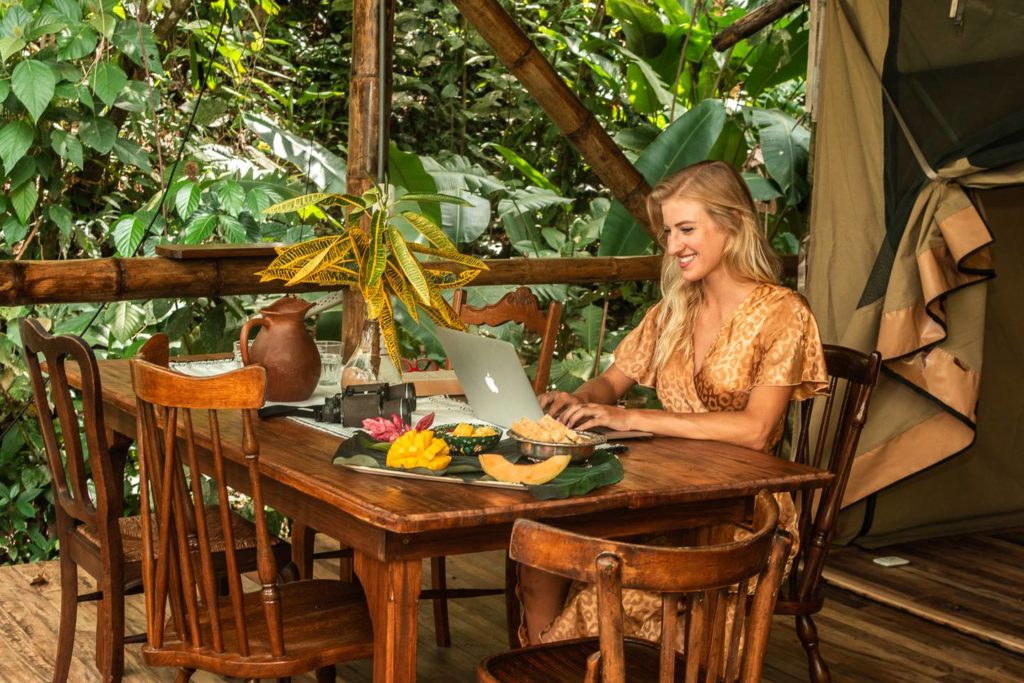Finally! Costa Rica will begin hosting digital nomads under a new special residency category or visa. It comes after a long, 11 month process that culminated in the signing of the bylaws that underpin the Law to Attract International Remote Workers and Service Providers (Law 10,008).
Tourists interested in applying for this category can do so once the decree is published in the official government newspaper, La Gaceta. For now, the Department of Immigration only accepts applications for 90 day tourist visas and has not yet created a platform for the digital nomad subcategory. El Financiero reviewed the bylaws sent by the presidency and spoke with Alfredo Abrego, head of the Department of Immigration, and Mario Rodriguez, head of regional immigration for law office Outlier Legal. Below, we explain the steps tourists must take to telecommunte from Costa Rica.
Who qualifies for a digital nomad visa? What kinds of job, employer and revenue conditions must they meet?
According to the definition in the bylaws, “a foreign person that provides remote paid services, whether subordinate or not, using computers, telecoms or analog means for someone else who resides abroad and receives at least $3,000 in payments from abroad. In the case of a person requesting legal residency for his or her dependents, the amount is $4,000, according to the official exchange rate determined by the Central Bank of Costa Rica.”
Practically the only characteristic that a tourist must have to qualify for the visa is that the payment must be received outside of Costa Rica.
“The bylaws don’t mention or specify which country, in what condition nor in which bank, nor whether or not the money is in cash or not or under what method the money must be received. It just says that it must be done in a foreign bank, so the money must be received in a foreign entity,” said Rodríguez from Outlier Legal.
What requirements must a tourist meet to apply for the digital nomad category?
- Fill out a request form. It must be signed by the tourist or their legal representative. It can be digitally accessed through theTrámite Ya platform. It can also be done physically by visiting an immigration office.
- Present a receipt of payment to the government for $100 or its equivalent in colons at the Central Bank of Costa Rica’s official exchange rate.
- A photocopy of the ID page of your passport and of the page with your most recent Costa Rica entry visa stamp. You must have your passport with you during this process.
- Consular visa for countries in the corresponding groups requiring consular visa. This also applies if you are in the country, according to the dispositions of the “general directions of visas of entry and permanence for non residents.”
- Bank statements accompanied by an affidavit stating that the statements have been requested and obtained from an accredited financial institution, or a certificate from a certified public accountant (CPA) or notary public (in the case it is done from Costa Rica). The certificate must be legalized at a consulate or apostilled, according to the bylaws.
All documents issued in a foreign language must be officially translated to Spanish. Informed consent document authorizing the Department of Immigration to hold information on applicants within their database. The Department of Immigration will also require a criminal background check through national or international databases. They may also conduct biometric reviews.
What documents must family members or those who accompany the digital nomad present?
- Marriage certificate valid for no more than six months.
- Document that shows the declaration or recognition of the joint relationship requested and valid for no greater than six months.
- Copy of the certificate of proof of birth in the case of minors or single people under 25.
- If the dependent is handicapped, a medical certificate must be presented showing the condition.
- Senior citizens must prove the existence of a connection or partnership with the person who is applying to the special stay through an affidavit. All documents in foreign languages must be officially translated to Spanish.
Document of informed consent authorizing the Department of Immigration to hold information on applicants within its databases.
Through what immigration channels can a tourist apply for a digital nomad visa?
Foreigners who wish to apply for the non-resident immigration category, subcategory “Remote Worker or Service Provider” must fill out an application and sign it, or have a legal guardian or representative sign it. It can be digitally accessed through Immigration’s Trámite Ya or requested in person by visiting an immigration office.
For now, the Tramite Ya website only has a form for applying for a 90-day tourist visa and hasn’t created the category for digital nomads yet, according to our sources, nor have they provided information on other channels where the tourist can apply.
We asked the Department of Immigration about the form, and they said that they are “tightening up details to start the process,” and that once the bylaws are published in La Gaceta they will “provide more clear communication to applicants.”
Can someone apply for the digital nomad visa from their country of origin before arriving in Costa Rica, or do they have to be in Costa Rica?
You can apply both ways. If the tourist is in his country of origin, he or she can apply digitally on the Tramite Ya platform. Once their application is approved they can travel to Costa Rica.
They can also arrive in Costa Rica, or if they arrived under a different category and wish to switch to digital nomad, they can do it here electronically or in person.
How long does Immigration normally take to provide a response?
By law, immigration has 90 days to issue a resolution on an application for temporary or permanent residence, Outlier Legal’s Rodriguez said. But, in reality, it can take between 12-15 months, he said.
The digital nomad bylaws establishes a 15 day deadline, but the spokesman said that “experience” indicates that the 15-day timeframe probably won’t be respected, and applications will likely take at least 4 months to be processed and resolved, considering the demand applications they are expecting.
“In October 2020, the Immigration Department established Tramite Ya to expedite residency applications, but the reality is that they still aren’t processing applications within the time period established by law,” Rodriguez said.

What are the fiscal incentives for digital nomads?
The bylaws state that, under no circumstance will digital nomads be considered permanent residents in the country for tax purposes, nor will their revenue stream from abroad be considered a Costa Rican source of income, so they are exempt from paying Costa Rican income taxes and import duties on basic personal equipment such as a cell phone, tablet, camera and recording equipment.
For objects not specified in the law that nomads want to bring, they must go through a parallel process via an electronic platform at the Finance Ministry called EXONET. It will allow applicants to file requests for tax exemptions.
Other benefits include permission to use a driver’s license from the country of origin for the duration of your stay.
The bylaws require all documents needed for the application to be translated to Spanish. Who is authorized to do this translation?
For the security of the applicant, translation can be done by an official translator at the Ministry of Foreign Affairs in Costa Rica or by a notary public with knowledge of the language. It can also be translated abroad, but it is best to have it done by a Costa Rican translator to avoid mistakes or issues with the translation.
Where should the digital nomad deposit the $100 in government accounts in order to enter the country?
The $100 should be deposited in accounts that belong to the Republic of Costa Rica, specifically account number242480-0 at the Banco de Costa Rica (BCR) which is normally where payments are made to enter the country. The payment receipt must be attached to the form that applicants fill out on Trámite Ya or taken in print to immigration offices.
How does the medical insurance work for digital nomads?
The medical insurance must cover nomads for their entire stay in Costa Rica and cover expenses up to $50,000. The policy can be international or from a local insurer that is regulated by Costa Rica’s General Insurance Regulator (Sugese). If the nomad brings dependents, each one of them must also be insured.
SOURCE EL FINANCIERO

